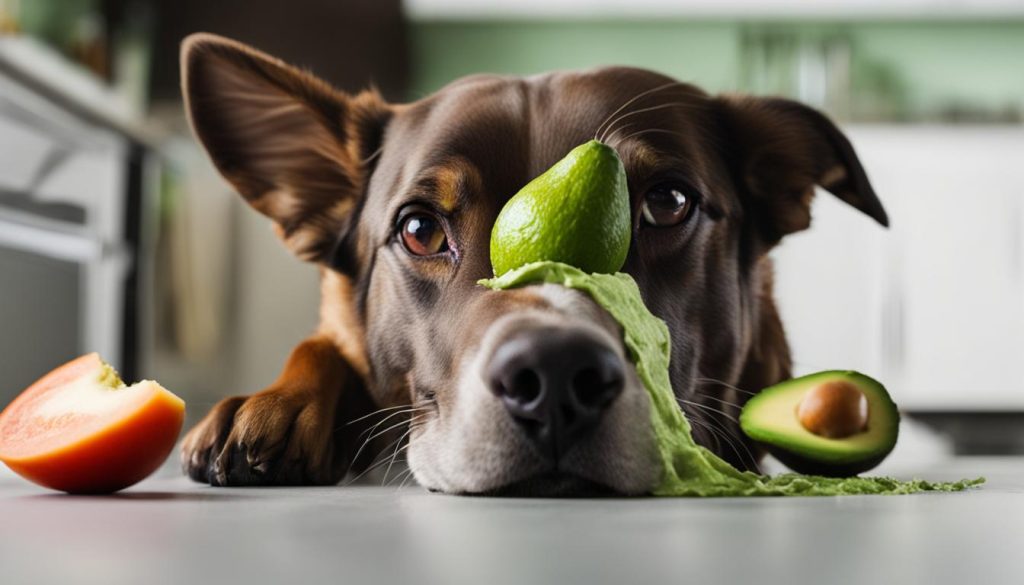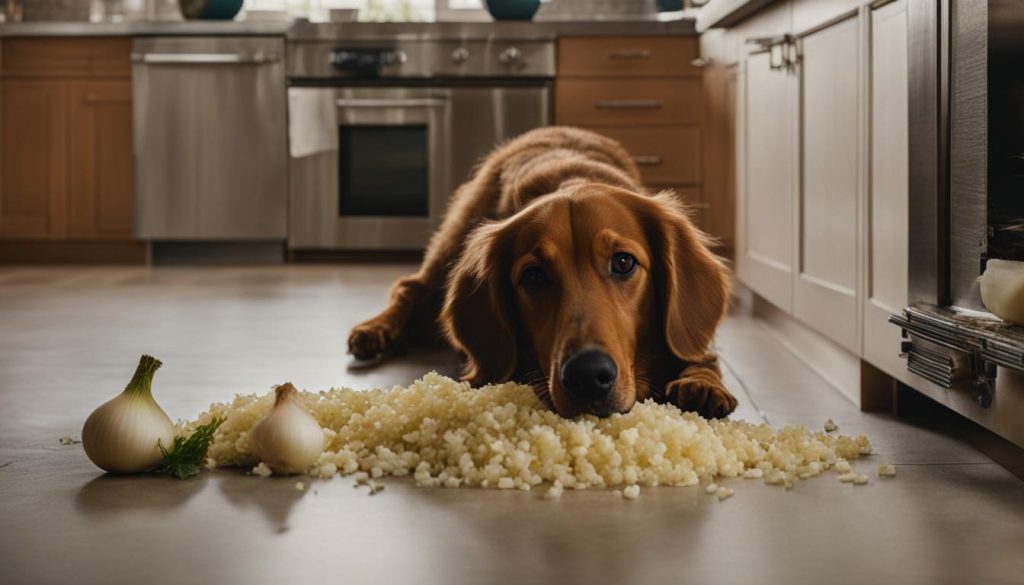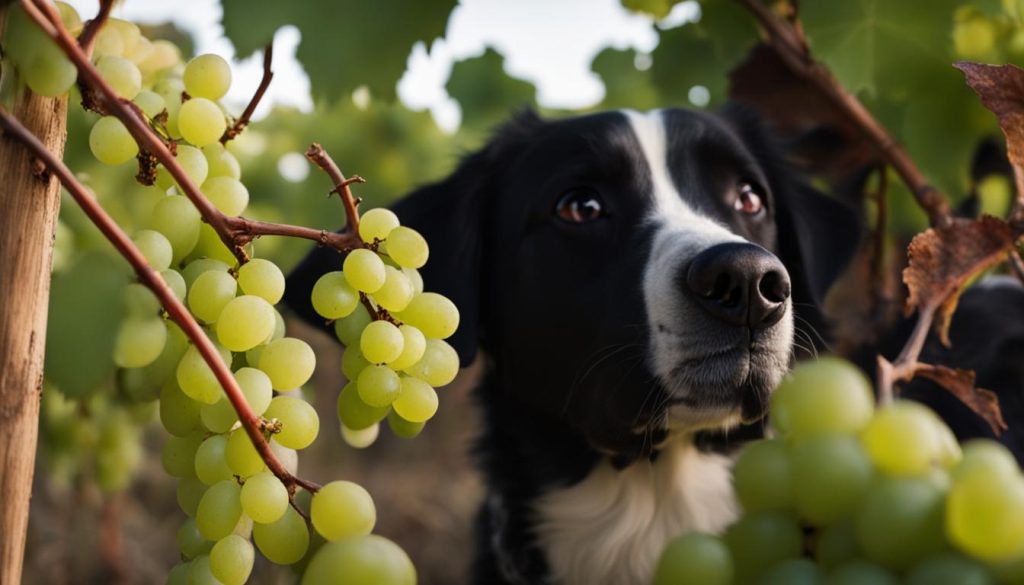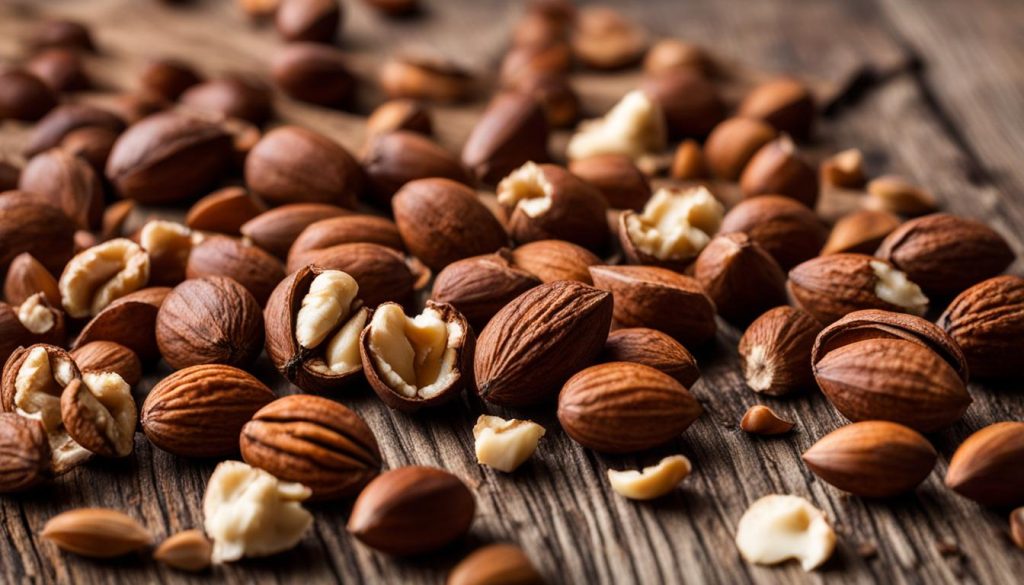As a responsible dog owner, it’s crucial to be aware of the human foods that can be toxic and harmful to our furry friends. While it may be tempting to share our meals with them, some foods can have severe consequences on their health. To ensure the well-being of your beloved dog, it’s essential to understand the dangers associated with certain human foods.
Key Takeaways
- There are several human foods that can be toxic and harmful to dogs.
- Chocolate contains methylxanthines, which can cause severe health problems in dogs.
- Avocados contain a toxic fatty acid called persin, making them dangerous for dogs.
- Onions and garlic can damage a dog’s red blood cells, leading to anemia.
- Grapes and raisins can cause kidney failure in dogs even in small amounts.
Chocolate

Chocolate is a well-loved treat for many humans, but it is extremely dangerous for dogs. This popular sweet contains a substance called methylxanthines, specifically theobromine and caffeine, which can be toxic to dogs. Even small amounts of chocolate can lead to symptoms like diarrhea and vomiting, while larger amounts can result in more severe health issues.
The theobromine present in chocolate affects dogs differently than humans. Dogs metabolize theobromine much more slowly, causing it to build up in their bodies to toxic levels. This can lead to a range of symptoms, including increased heart rate, restlessness, muscle tremors, and in severe cases, seizures and irregular heart function. In some instances, chocolate ingestion can even be fatal for dogs.
If you suspect that your dog has ingested chocolate or is showing any symptoms of chocolate toxicity, it is crucial to seek immediate veterinary care. The veterinarian may induce vomiting or administer activated charcoal to prevent further absorption of theobromine. Early intervention is essential in minimizing the potential harm caused by chocolate ingestion in dogs.
Dogs and Avocados

Avocados have become increasingly popular in human diets due to their nutritional benefits and creamy texture. However, when it comes to dogs, avocados can be potentially harmful. It’s important for dog owners to understand the risks associated with feeding avocados to their pets.
Avocado toxicity in dogs is primarily due to a substance called persin, which is found in various parts of the avocado, including the fruit, pit, leaves, and bark. While persin is generally harmless to humans, it can be toxic to dogs, especially in large quantities. Dogs may experience gastrointestinal upset, such as vomiting and diarrhea, if they consume avocados.
While the flesh of the avocado itself may not be as toxic as the pit or leaves, it is still best to keep avocados away from dogs. Please be aware that some dogs may have a higher sensitivity to avocados than others, and even small amounts of avocado can cause an adverse reaction. As a responsible dog owner, it’s best to err on the side of caution and avoid feeding avocados to your furry friend.
Table: Foods Dogs Should Avoid
| Foods | Toxicity |
|---|---|
| Chocolate | Severe health problems |
| Onions and Garlic | Damage red blood cells |
| Grapes and Raisins | Kidney failure |
| Milk and Dairy Products | Digestive problems |
| Macadamia Nuts | Toxicity |
| Sugary Foods and Drinks | Weight gain, tooth decay |
| Caffeine | Various health issues |
| Yeast Dough | Alcohol poisoning, gastrointestinal issues |
| Salt | Dehydration, sodium ion poisoning |
It’s important to remember that every dog is different, and their tolerance to certain foods may vary. While avocados are generally considered unsafe for dogs, it’s always a good idea to consult with your veterinarian before introducing any new foods into your dog’s diet. Your vet can provide personalized recommendations based on your dog’s specific needs and health status.
Dogs and Onions: A Toxic Combination

Onions may be a staple in our kitchen, but when it comes to our furry friends, they can be hazardous. Dogs and onions should never mix, as both raw and cooked onions can be toxic to dogs. Onions contain a substance called thiosulphate, which can cause damage to a dog’s red blood cells and lead to a condition called hemolytic anemia.
The toxicity of onions affects all breeds and sizes of dogs, and even a small amount can be dangerous. Symptoms of onion toxicity in dogs include weakness, vomiting, diarrhea, and an elevated heart rate. It’s important to remember that all forms of onions, whether it’s raw onions, cooked onions, or even onion powder, should be avoided when it comes to feeding our canine companions.
As responsible dog owners, it’s our duty to keep our pets safe from harm. This means being cautious about the food we give them. So next time you prepare a meal, be mindful of the ingredients and ensure that onions and other members of the Allium family, such as garlic, are kept out of reach of your four-legged friend. Remember, prevention is key when it comes to protecting our dogs from the potential dangers of onions.
Grapes and Raisins

Grapes and raisins can be extremely toxic to dogs and should never be fed to them. Even a small amount of grapes or raisins can cause serious health problems, including kidney failure. It’s important to keep these fruits away from dogs to ensure their safety and well-being.
When a dog ingests grapes or raisins, they may experience symptoms such as vomiting, diarrhea, and lethargy. These symptoms can progress rapidly, leading to dehydration and kidney damage. Immediate veterinary care is necessary if you suspect your dog has eaten grapes or raisins.
To emphasize the severity of grape and raisin toxicity in dogs, here are some key points to remember:
Grapes and raisins contain a substance that is toxic to dogs, even in small amounts.
Symptoms of grape or raisin ingestion include vomiting, diarrhea, and lethargy.
Kidney failure can occur in dogs who consume grapes or raisins.
Immediate veterinary care is crucial if your dog has ingested grapes or raisins.
Table: Foods Toxic to Dogs
| Foods | Toxicity | Symptoms |
|---|---|---|
| Grapes | Highly toxic | Vomiting, diarrhea, lethargy, kidney failure |
| Raisins | Highly toxic | Vomiting, diarrhea, lethargy, kidney failure |
As shown in the table, grapes and raisins are highly toxic to dogs. It’s important to be vigilant and keep these foods out of your dog’s reach. If you suspect your dog has ingested grapes or raisins, contact your veterinarian immediately for guidance and treatment.
Milk and Dairy Products

When it comes to milk and dairy products, it’s important to consider that while puppies can drink milk from their mother, most adult dogs are lactose intolerant. Dairy products like cow’s milk and cheese can lead to digestive problems in dogs, including diarrhea and stomach upset. It’s best to avoid feeding dogs any dairy products. Instead, opt for dog-friendly alternatives that are specifically formulated for their nutritional needs.
While some dogs may tolerate small amounts of dairy without adverse effects, it’s important to monitor their reactions closely. Signs of lactose intolerance in dogs can include gas, bloating, and discomfort. If your dog experiences any of these symptoms after consuming dairy, it’s best to remove milk and dairy products from their diet to prevent any further discomfort or digestive issues.
It’s worth noting that there are dairy alternatives available on the market specifically designed for dogs. These products are lactose-free and provide the necessary nutrients without the potential digestive upset associated with traditional dairy products. If you’re unsure about the best options for your dog, consult with your veterinarian, who can provide tailored advice based on your dog’s individual needs and dietary requirements.
Summary:
- Milk and dairy products can lead to digestive problems in dogs
- Most adult dogs are lactose intolerant, so it’s best to avoid feeding them dairy
- Look for dog-friendly alternatives that are specifically formulated for their nutritional needs
- Monitor your dog’s reaction closely and consult with your veterinarian for personalized advice
Macadamia Nuts

Macadamia nuts are considered toxic to dogs and can have harmful effects on their health. Consumption of macadamia nuts can lead to a condition known as macadamia nut toxicity, which can manifest in various symptoms and require immediate attention. The exact reason behind the toxicity is still not fully understood, but it is advised to keep macadamia nuts away from dogs to prevent any potential harm.
Dogs that ingest macadamia nuts may experience symptoms such as muscle tremors, weakness in the back legs, vomiting, and an elevated body temperature. These symptoms can occur within a few hours of consumption and can persist for up to 48 hours. If you suspect that your dog has ingested macadamia nuts or is displaying any of these symptoms, it is important to consult a veterinarian for proper diagnosis and treatment.
While the exact mechanism of toxicity is unknown, it is believed that macadamia nuts contain a substance that affects the nervous system of dogs. The severity of symptoms can vary depending on the amount of nuts consumed and the size of the dog. It is always better to err on the side of caution and avoid giving macadamia nuts to dogs altogether.
Table: Macadamia Nut Toxicity Symptoms
| Symptoms | Signs |
|---|---|
| Muscle tremors | Shaking or trembling of the muscles |
| Weakness in the back legs | Difficulty in walking or standing |
| Vomiting | Forceful expulsion of stomach contents |
| Elevated body temperature | Increased body temperature |
It is important to note that macadamia nuts are not the only type of nut that can be harmful to dogs. Other nuts, such as walnuts and pecans, contain high-fat content and can potentially cause gastrointestinal issues or pancreatitis in dogs if consumed in large quantities. Therefore, it is generally recommended to keep all types of nuts, including macadamia nuts, away from dogs.
As responsible dog owners, it is our duty to ensure the safety and well-being of our furry companions. By being aware of the potential dangers associated with certain foods, such as macadamia nuts, we can take proactive measures to protect our dogs from accidental ingestion and potential harm.
Sugary Foods and Drinks
Dogs should not consume foods or drinks that are high in processed sugars. Similar to humans, excessive sugar intake in dogs can lead to weight gain, tooth decay, and even diabetes. It’s best to avoid giving sugary treats to dogs.
When dogs consume sugary foods and drinks, their bodies experience a surge in blood sugar levels. This can result in an energy rush followed by a crash, leaving them feeling lethargic and potentially causing damage to their organs over time.
Instead of sugary treats, opt for healthier alternatives that are safe for dogs. There are many dog-friendly snacks available in the market that are low in sugar and specifically formulated to cater to their nutritional needs. These treats provide a delicious and satisfying reward for your furry friend without compromising their health.
“Feeding dogs a diet high in processed sugar can have detrimental effects on their overall health,” says Dr. Jane Smith, a veterinarian with over 10 years of experience. “It’s important to be mindful of the ingredients in the food and treats you give to your dog, and opt for options that are specifically designed for them.”
The Dangers of Processed Sugar in Dogs
Processed sugar, often found in candies, desserts, and sugary beverages, can pose several risks to dogs. Here are some of the potential dangers of feeding dogs sugary foods and drinks:
- Weight Gain: Excessive sugar consumption can lead to weight gain in dogs, which can contribute to obesity and related health issues.
- Tooth Decay: Sugar can cause tooth decay and cavities in dogs, just like in humans. This can lead to dental problems and discomfort.
- Diabetes: Dogs can develop diabetes as a result of a high-sugar diet. This condition requires a strict management plan and can have long-term health implications.
For the health and well-being of your furry companion, it’s essential to provide a balanced diet that is free from excessive sugar. Consult with your veterinarian to determine the best dietary choices for your dog and ensure their long-term health and happiness.
| Human Foods Dogs Should Avoid | Reasons to Avoid Them |
|---|---|
| Chocolate | Contains methylxanthines, which can cause severe health problems in dogs. |
| Avocados | Contain persin, a fatty acid that can be toxic to dogs. |
| Onions and Garlic | Can damage a dog’s red blood cells and lead to anemia. |
| Grapes and Raisins | Can cause kidney failure in dogs, even in small amounts. |
| Milk and Dairy Products | Most adult dogs are lactose intolerant and can experience digestive problems. |
| Macadamia Nuts | Can cause symptoms such as muscle shakes, weakness, and vomiting in dogs. |
| Sugary Foods and Drinks | Excessive sugar intake can lead to weight gain, tooth decay, and diabetes in dogs. |
| Caffeine | Is a stimulant that is toxic to dogs and can cause various symptoms. |
| Yeast Dough | Raw dough can expand in a dog’s stomach and cause alcohol poisoning. |
| Salt | Excessive salt intake can lead to dehydration and sodium ion poisoning in dogs. |
Dogs and Caffeine: The Dangers of Coffee for Dogs
When it comes to our furry friends, it’s important to remember that not all foods and beverages that are safe for humans are safe for dogs. This includes caffeine, which can have toxic effects on dogs if consumed in large quantities. While a sip or two of coffee may not pose an immediate threat, it’s best to avoid giving dogs any caffeinated beverages.
Caffeine, whether in coffee, tea, or energy drinks, is a stimulant that affects the central nervous system. In dogs, the effects of caffeine can be much more pronounced than in humans due to their smaller body size and different metabolism. Even a small amount of caffeine can lead to symptoms such as vomiting, diarrhea, abnormal heart rhythm, panting, excessive thirst, and even seizures. In severe cases, caffeine toxicity can be life-threatening for dogs.
It’s important to be mindful of other sources of caffeine in your home as well. Some dog owners may not realize that certain foods, such as chocolate or cocoa powder, also contain caffeine. Therefore, it’s crucial to keep all caffeinated products out of your dog’s reach to prevent accidental ingestion.
Dogs and Yeast Dough: A Dangerous Combination
When it comes to feeding our furry friends, it’s important to be aware of the potential dangers lurking in our kitchens. One such hazard is yeast dough, which can be highly toxic to dogs if ingested. Yeast dough is a dangerous combination for dogs due to the fermentation process that occurs in their stomachs.
The Dangers of Raw Yeast Dough
Raw yeast dough can expand rapidly in a dog’s stomach, causing bloating and discomfort. The fermentation process releases alcohol, which can lead to alcohol poisoning in dogs. Ingesting yeast dough can also result in gastrointestinal issues such as vomiting, diarrhea, and abdominal pain. This combination of factors makes yeast dough a serious threat to the health and well-being of our canine companions.
“Ingesting yeast dough can result in alcohol poisoning, bloating, and gastrointestinal issues.”
Prevention and Treatment
The best way to protect your dog from the dangers of yeast dough is to ensure it is kept out of their reach. Be mindful of any leftovers or unbaked dough that may be accessible to your curious pup. If you suspect that your dog has ingested yeast dough, it’s crucial to seek immediate veterinary care. Prompt treatment can help minimize the potential risks and ensure your dog receives the necessary care to make a full recovery.
Wrapping Up
As responsible pet owners, it’s our duty to keep our dogs safe from harmful foods. Yeast dough poses a serious threat to their health, with potential complications ranging from alcohol poisoning to gastrointestinal distress. By being vigilant and proactive in preventing access to yeast dough, we can protect our beloved pets and provide them with a safe and healthy environment.
Dogs and Salt
When it comes to our furry friends, it’s important to be mindful of their diet and ensure they are not consuming anything that could be harmful to their health. One such food item that dog owners should be cautious about is salt. While a small amount of salt is usually fine for dogs, excessive salt intake can lead to dehydration and sodium ion poisoning.
Salt toxicity in dogs can manifest in various ways, including increased thirst and urination, vomiting, diarrhea, lethargy, muscle tremors, and in severe cases, seizures. Dogs have a lower tolerance for salt compared to humans, so it’s essential to control their salt intake and avoid feeding them excessively salty foods.
High-sodium foods that should be avoided include salty snacks like potato chips, pretzels, and salted popcorn, as well as processed meats like sausage and hot dogs, which often contain high levels of salt. It’s also important to be aware that certain human foods, such as canned soups and broths, may contain high amounts of sodium. Always read the labels and avoid feeding your dog anything that is high in salt content.
If you suspect that your dog has ingested a large amount of salt or is displaying symptoms of salt toxicity, it’s crucial to seek immediate veterinary care. A veterinarian will be able to provide the necessary treatment and support to ensure your dog’s well-being. Remember, prevention is the best approach when it comes to protecting your furry friend from the negative effects of excessive salt intake.
| Foods to Avoid | Sodium Content |
|---|---|
| Processed meats (e.g., sausage, hot dogs) | High |
| Canned soups and broths | High |
| Potato chips and pretzels | High |
| Fast food and restaurant leftovers | Varies |
As a responsible pet owner, it’s important to prioritize your dog’s health and well-being. By being aware of the potential dangers associated with excessive salt intake, you can make informed choices about what foods to avoid feeding your furry friend. Remember, a balanced and nutritious diet is key to keeping your dog happy and healthy.
Wrapping Up
As I conclude this article, it is of utmost importance for dog owners to be aware of the human foods that can be toxic and harmful to our furry friends. By understanding and avoiding these dangerous foods, we can protect the health and well-being of our beloved dogs. Remember, prevention is key in ensuring their safety.
Feeding dogs a healthy and balanced diet is essential, and that means keeping them away from human foods that can be toxic. The list of foods to avoid includes chocolate, avocados, onions, garlic, grapes, raisins, milk and dairy products, macadamia nuts, sugary foods and drinks, caffeine, yeast dough, and excessive salt. These foods can pose serious risks to your dog’s health and should be strictly avoided.
If you suspect that your dog may have ingested any of these harmful foods, it is crucial to seek immediate veterinary care. Quick action can make all the difference in protecting your dog from the potential dangers these foods may pose. Always prioritize your dog’s safety and well-being by providing them with a safe and appropriate diet.
To summarize, understanding the human foods that dogs should not eat is an essential part of responsible pet ownership. By staying informed and taking necessary precautions, we can ensure that our dogs live long, healthy, and happy lives.
FAQ
What human foods should dogs never eat?
Dogs should never eat chocolate, avocados, onions, garlic, grapes, raisins, milk, dairy products, macadamia nuts, sugary foods and drinks, caffeine, raw yeast dough, and excessive salt.
Why is chocolate dangerous for dogs?
Chocolate contains methylxanthines, which can cause severe health problems in dogs, including diarrhea, vomiting, seizures, irregular heart function, and even death.
What makes avocados toxic to dogs?
Avocados contain a fatty acid called persin, which is toxic to dogs in large quantities and can cause gastrointestinal upset and other health issues.
How do onions and garlic harm dogs?
Onions and garlic can damage a dog’s red blood cells and lead to anemia. It’s best to avoid feeding dogs both onions and garlic, whether raw, cooked, or in powdered form.
Why are grapes and raisins harmful to dogs?
Grapes and raisins can cause kidney failure in dogs, even in small amounts. Symptoms include repeated vomiting and lethargy.
Can dogs consume milk and dairy products?
While puppies can drink milk from their mother, most adult dogs are lactose intolerant. Dairy products like cow’s milk and cheese can lead to digestive problems in dogs, including diarrhea and stomach upset.
What makes macadamia nuts toxic to dogs?
The exact reason is still unknown, but macadamia nuts are toxic to dogs. Consumption can lead to symptoms such as muscle shakes, weakness in the back legs, vomiting, and high temperature.
Why should sugary foods and drinks be avoided for dogs?
Excessive sugar intake in dogs can lead to weight gain, tooth decay, and even diabetes. It’s best to avoid giving sugary treats to dogs.
Why is caffeine toxic to dogs?
Caffeine is a stimulant that can cause vomiting, diarrhea, abnormal heart rhythm, panting, excessive thirst, and even seizures in dogs. Dogs should only drink water and avoid all caffeinated beverages.
How does raw yeast dough harm dogs?
Raw yeast dough can expand and ferment in a dog’s stomach, leading to alcohol poisoning and gastrointestinal issues. It’s important to keep dogs away from any leftover yeast dough.
Can too much salt be harmful to dogs?
Too much salt can lead to dehydration and sodium ion poisoning in dogs. While a small amount of salt is usually fine, it’s important to control salt intake in your dog’s diet and prevent excessive consumption.






